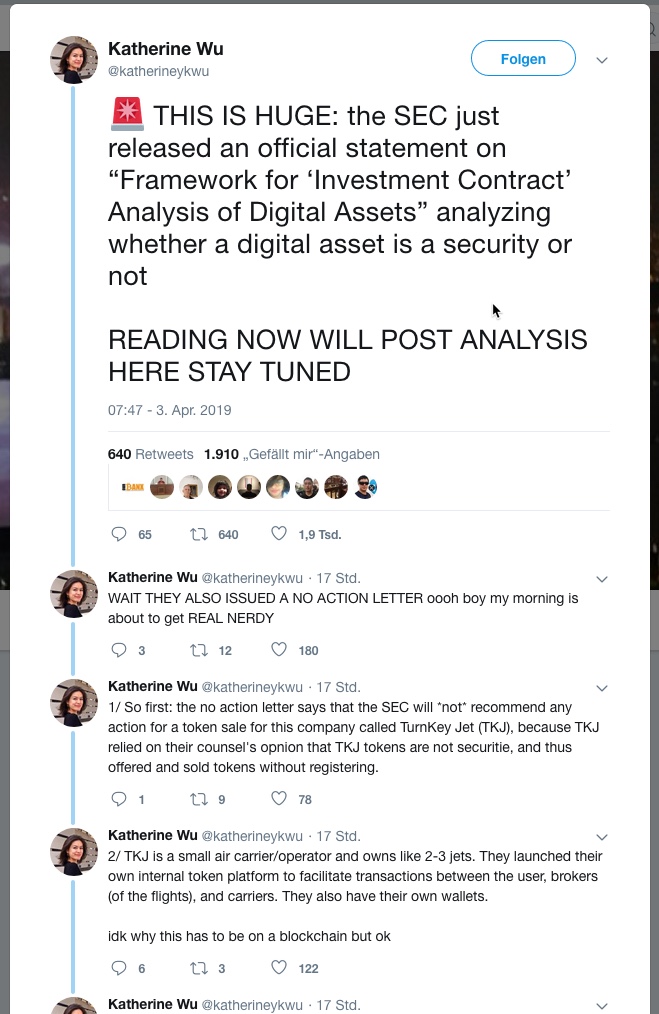Mit dem BMF-Schreiben „Einzelfragen zur ertragsteuerrechtlichen Behandlung von virtuellen Währungen und von sonstigen Token“ gibt das Bundesministerium der Finanzen den Praktikern in Finanzverwaltung und Wirtschaft, aber auch den einzelnen Steuerpflichtigen einen rechtssicheren und praktikablen Leitfaden zur ertragsteuerrechtlichen Behandlung nicht nur von Bitcoin an die Hand. Das BMF-Schreiben wurde in enger Abstimmung mit den obersten Finanzbehörden der Länder erarbeitet. Behandelt werden neben dem An- und Verkauf virtueller Währungen und sonstiger Token insbesondere die Blockerstellung, die bei Bitcoin Mining genannt wird. Daneben beschäftigt sich das BMF-Schreiben mit Staking, Lending, Hard Forks, Airdrops, den ertragsteuerrechtlichen Besonderheiten von Utility und Security Token sowie Token als Einkünfte aus nichtselbständiger Arbeit.
Das Bundeskabinett hat heute (Anm. 18.09.2019) die Blockchain-Strategie verabschiedet. Das Bundesministerium für Wirtschaft und Energie (BMWi) und das Bundesministerium der Finanzen (BMF) haben sie unter Einbeziehung der übrigen Ressorts erarbeitet.
Bundeswirtschaftsminister Peter Altmaier: „Die Potenziale der noch jungen Blockchain-Technologie sind hoch. Deutschland ist dabei weltweit unter den führenden Standorten. Mit der Blockchain-Strategie wollen wir dazu beitragen, diesen Vorsprung zu halten und auszubauen. Ein Fokus liegt dabei im Energiebereich. Hier können wir doppelt punkten, indem wir in Pilotprojekten die Chancen der Blockchain-Technologie nutzen und gleichzeitig die Digitalisierung der Energiewende vorantreiben.“ Weiterlesen
Source: https://slate.com
Your data is not property. It’s a piece of who you are.
The Facebooks and Googles of the world are getting rich off your data. Market researchers at PwC estimate that in 2018, companies that collect personal data to use for targeted advertising brought in $178 billion in revenue. Data brokers last year earned a further $21 billion. And these numbers are only trending up. By 2025, PwC expects the global data economy to be worth more than $400 billion.
So it’s about time we get in on the action, right?
Source: https://putanumonit.com
Does game theory apply to real life? It’s easy to fall into one of two errors:
- Thinking that human interactions can be precisely modeled by a 2×2 payout matrix, and being shocked by the vagaries of human psychology.
- Thinking that since humans aren’t rational game theory doesn’t apply to them, and being shocked when they follow incentives in predictable patterns after all.
Of course, human behavior is a combination of both elements: the mathematical structure of payoffs, incentives, and equilibria, the idiosyncrasies of culture, mood, and personality. Understanding both sides can be quite a superpower. I know people who made millions and bankrupted competitors by tweaking some small features of a public auction. This stuff is hard, but it works.
I took every available class on the math of game theory as an undergrad. Since then, I’ve been catching up on the squishy human part of the equation. There’s plenty of great research in this area, but the best way to learn about people is to observe them in their habitat. So when my friend Spencer told me that he’s organizing a live game theory party, I jumped at the opportunity.
I will break with tradition by not repeating the descriptions of common games that you’ve heard 100 times before, nor by deriving the rational strategies and equilibria. If you need to catch up on the math you can follow the links to Wikipedia etc. Weiterlesen
Die United States Securities and Exchange Commission (SEC) hat eine Stellungnahme zu den Rahmenbedingungen für ‘Investment Contract’ Analysis of Digital Assets” veröffentlicht. Dabei geht es beispielsweise darum welche Token als Security (Aktie) behandelt werden. Regulatorisch ist das Dokument eher für geplante ICO’s interessant als für den eigentlichen Token-Nutzer. Zudem handelt es sich dabei eher um eine Richtlinie als ein verbindliches Schreiben.
Hier das Original der SEC: SEC – DLT framework pdf
Stupid About — Blockchain
A Smart Guide to the Emerging Technology Wilderness: 1.01
The rules of blockchain:
Rule #1 — You probably don’t need blockchain
Rule #2 — You probably won’t be able to live without blockchain
Rule #3 — By the time you need blockchain, you won’t know you’re using blockchain

I once had to brief the leaders of a large enterprise on “this blockchain thing.” Their customers were asking about it, and they needed answers. I spent hours with them. They managed to figure out how to spell it, but they weren’t getting it. I don’t think they ever really did. How “stupid,” right?
But here’s the thing. Those leaders are wickedly smart about getting 200,000 people to work together without running amok. They are smarter about that subject than I may ever be. (Not ruling it out.) Weiterlesen

